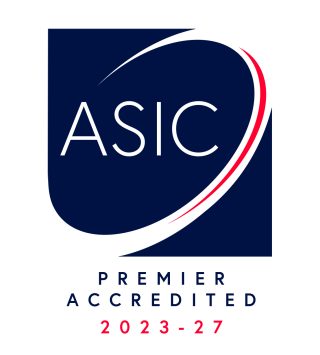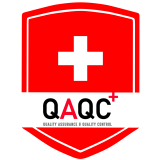ACCREDITATIONASIC UK
INTRODUCTIONWhy ASIC Accreditation
ASIC Accreditation is a leading, globally recognised quality standard in international education. Institutions undergo an impartial and independent external assessment process to confirm their provision meets rigorous internationally accepted standards, covering the whole spectrum of its administration, governance, and educational offering. Achieving ASIC Accreditation demonstrates to students and stakeholders that an institution is a high-quality education provider that delivers safe and rewarding educational experiences and is committed to continuous improvement throughout its operation.

About ASIC: One of the largest international accreditation agencies operating in 70+ countries, ASIC is recognised in the UK by UKVI – UK Visas and Immigration (part of the Home Office of the UK Government), is ISO 9001:2015 (Quality Management Systems) Accredited and is a Full Member of The International Network for Quality Assurance Agencies in Higher Education (INQAAHE), a member of the BQF (British Quality Foundation), a member of the International Schools Association (ISA), and an institutional member of EDEN (European Distance and E-Learning Network).
ASIC UKAccredited
Status
SIMI SWISS FULLY ADAPTASIC UK
Accreditation Standards
- The University has documented tenure on its premises and appropriate planning approval.
- All external and internal signage is clear, comprehensive, current and accurate.
(This includes institutional, floor and room signs; and programmes, affiliations and logos on display.) - Building facilities and maintenance ensure a safe and clean environment for staff and students, with adequate lighting, heating and ventilation, and sanitary provision.
(Toilets should be clean and well maintained with full hand washing and drying facilities.) - Students have access to informal study areas including IT provision where appropriate. (It is expected that there are opportunities for independent study within the University, that is, quiet study areas and casual access to IT laboratories/Wi-Fi facilities. Students are expected to have free access to the internet, including e-mail.)
- All staff have access to work spaces, including those which are shared (hot-desking) and IT.
- Classrooms, laboratories, research centres, workshops, and other specialised teaching areas, provide safe and adequate space for the numbers of students required to use them and are equipped to a level consistent with the needs of the academic programmes.
(Classrooms: The number of seats in teaching facilities should match class numbers. IT laboratories are expected to have up-to-date computers, printers etc. with broadband access. Universities teaching English language are expected to have supporting technology.) - The University’s health and safety measures ensure that local legal (statutory) and ASIC requirements are met in relation to general safety, first aid, fire precautions and safety in areas of particular hazard (e.g. science laboratories); relevant staff receive appropriate training in these aspects, and rules and procedures are properly displayed and students and staff fully briefed. This applies to all premises owned or leased by the University. (ASIC recognises that some requirements may not be fully achievable in certain countries.)
- Any dedicated facilities for the preparation of food and drink meet statutory, local authority, hygiene requirements.
- The governance arrangements, staff numbers and structure, and vision for the University are appropriate for the scale and nature of the operation.
- Communication amongst governors, management and all staff is effective. (Regular, recorded meetings of staff should take place to manage the operations of the University at various appropriate levels.)
- Local/legal employment requirements are met/good practice exists in terms of equal opportunities, disciplinary and grievance procedures, and staff workloads. There is the equivalent, where possible, of Employer’s Liability insurance and Public Liability insurance, although it is recognised that insurance arrangements vary widely from one country to another.
- Programmes, individual courses and/or academic subject areas, including research, are managed by appropriately qualified and experienced staff.
- Classes are timetabled appropriately in terms of room sizes and their facilities, and programmes and assignments are scheduled to provide reasonable workloads for students and staff. Research students have suitable facilities and structured supervision arrangements are in place.
- Written procedures exist for the production and conduct of summative and formative tests/mock examinations, course work and other assessments; there are arrangements for the securestorage of examination papers, students’ scripts and students’ work.
- New staff receive an appropriate induction. There are appraisal/performance review and staff development systems for staff and all staff are encouraged/supported in engaging in self-development.
- All teaching staff are subject to review of their teaching with a view to achieving continuous improvement of standards. Research staff are reviewed on their scholarly activity, including papers written and presented at suitable conferences.
- Copyright regulations are observed.
- Data protection requirements are observed.
The general approach to students’ learning is that they should be guided and encouraged to take responsibility for their own learning. This helps to ensure that they can build on the knowledge and experience gained on their courses in taking higher level programmes and/or in developing their careers.
Expected standards for accreditation are that:
- Pre-enrolment, students receive details of entry requirements/other criteria, fee charges and refund policy and the personal documentation which has to be produced in order to complete enrolment.
- Students are carefully briefed on the nature and requirements of their chosen programmes/ research activity including curriculum, assessment regulations, reading lists/relevant academic papers.
- Academic staff have an appropriate level of subject knowledge (normally at least a first degree, or equivalent professional qualification and at an academic equivalent to the level of the programme(s) being taught) and pedagogic skills asevidenced (normally) by formal qualifications. Normally research supervisors are expected to be qualified to PhD level.
- The delivery of courses/programmes is conducted in ways which facilitate student learning, success and active participation, and is supported by appropriately equipped teaching facilities where applicable.
(Classroom observation by Inspectors will assess the effectiveness of academic delivery, including the recognition by staff of the needs of non-native speakers.) - The University has a strategic approach to research encompassing the research activity by both staff and students and, where appropriate, the commercialisation of research outcomes. The supervision of research is undertaken in ways which improve research students’ activities.
- The University library, which can be substantially online, provides copies of set texts and supporting texts, journals and relevant research publications. Guidance is provided on the use of public and electronic libraries, including any inter-library loan scheme. Guidance on further study and careers is available in the institution.
Programme review is an important procedure whereby the University reviews the delivery of its programmes and the success of the students as part of a process of continual improvement and of ensuring the on-going relevance of the curriculum.
Expected standards for accreditation are that:
- The University undertakes an annual academic review of its programmes and research activities, which includes formal input from students and staff.
- As part of the academic review process, the University monitors students’ academic development and pass/completion rates, including on research degrees, and analyses examination results to identify trends and inconsistencies.
- As part of the academic review process, mechanisms exist for students to provide feedback on the delivery of their programmes and/or the quality of research supervision, and the quality of the supporting resources.
- The mechanisms may include student questionnaires assessing individual staff performance, programme delivery and academic/welfare support;
representation on committees and/or staff/student liaison groups. - For programmes leading to its own awards (‘internal programmes’, see definition in Area of Operation F) the University has written procedures for curriculum development and course design; and the academic level of its programmes is consistent with internationally equivalent courses in universities or those offered by other relevant professional/awarding bodies.
Universities in many countries now seek to recruit international students from other countries. Such students often need support in addition to that provided for home students.
Expected standards for accreditation are that:
- Students receive advice/information and assistance in relation to such topics as living costs, police registration, registration for medical treatment, banking and travel cards.
- Ongoing welfare support is available to students from identified staff.
- There is an induction programme for new students
- In the case of students under the age of 18, the requirements of current legislation are met in respect of police checks on relevant staff, including any mandatory enhanced checks where personal tutoring/mentoring is in place.
- In the case of students with special learning, medical or physical needs, the requirements of any current local (in country) legislation are met and a level of support is offered, appropriate to the needs of the individual.
- Any homestay (that is, with families) arrangements are satisfactory in terms of selection and monitoring of providers and compliance with current in country legislation. Written guidance is given to students and providers.
- Formal and informal mechanisms exist for students’ complaints and grievances to be addressed.
An external programme is one in which the curriculum and assessment schedule is provided by an outside approved awarding body, including other national or overseas universities, professional bodies and other recognised awarding bodies.
An internal programme is one leading to the University’s own awards as approved by the relevant national authority.
ASIC inspections include an examination of the content and standard of the curriculum as well as the quality of its delivery to learners. We also pay close attention to the consistency and reliability of assessment. However, it should be noted that ASIC neither confers nor validates degree-awarding powers. Applicants for distance education programmes should always satisfy themselves that the level of recognition of a relevant award is sufficient to meet their needs.
Expected standards for accreditation are that:
External programmes.
- The University can demonstrate that its external courses lead to genuine accredited awards, such as franchises or validations from approved international universities and/or those leading to awards of recognised awarding bodies including those overseas;
the University ensures that students are registered with the awarding body.
Internal programmes.
- The University can demonstrate that its own internal programmes lead to awards/certification relevant to the needs of students.
- A documented framework for the frequent and regular formative assessment of students. Summative assessment of students is undertaken in an ethical, fair and robust manner.
- Students are made aware of what constitutes academic misconduct, such as cheating, personation, collusion, fabrication, ghosting, and plagiarism, and of the consequent penalties. The University takes steps to prevent academic misconduct.
Expected standards for accreditation are that:
- All staff and education representatives/agents adopt an honest, ethical approach in the marketing of the University and its courses/programmes and in the recruitment of students. An appropriate infrastructure exists for dealing with student enquiries.
- Agents working on behalf of the University overseas are recruited in the context of formal appointment criteria, are fully briefed and provided with relevant university literature so as to be able to assist prospective students with visa applications, if appropriate, and with the programme application process and associated aspects of programme entry. The University has effective systems to monitor agents’ practices and procedures.
- In its promotional literature and website the University provides prospective home and international students with accurate and comprehensive information on admissions requirements and procedures, the programmes available, tuition fees and living costs, living conditions, accommodation and student welfare. Prospectuses, websites and marketing literature neither include misleading, inaccurate or ambiguous statements in these respects nor draw false or unfounded comparisons with any other provider.
- Academic selection criteria, including English language or other language of instruction requirements, for home and international students are appropriate to the academic standards of the programmes for which they have applied so that students have a reasonable expectation of being successful. In selecting students, the University meets the requirements of equal opportunities and anti-discrimination legislation.
ASIC expects all of its accredited institutions to have written procedures for all of their policies and actions, and that the person(s) with responsibility for each procedure are able to explain it to the Inspectors. This has the added advantage that if staff undertaking particular roles leave or are unavailable at short notice, other staff assuming these roles will know exactly what is expected of them. This applies in particular to procedures for the recruitment, enrolment and monitoring of attendance and academic progress of home and international students.
Expected standards for accreditation are that:
- An appropriate infrastructure exists for dealing with student applications and making offers. Written administrative procedures exist for:
- processing applications;
- monitoring the number of offers made and accepted (if required for immigration purposes);
- the admission of students, to include verification of students’ academic qualifications, including competence in English language or other language of instruction at an appropriate level;
- checking the financial viability of the students;
- student admission and enrolment;
- the payment of deposits and fees and for maintaining financial records, together with a policy for the refund of deposits.
- The University creates and maintains accurate and up-to-date student files (see ASIC recommendations on student and staff files) and stores these securely.
- The University can demonstrate that it attempts to identify those students who have been granted a visa to enable them to study at the University but who fail to enrol within ten working days from the scheduled commencement date of the course (that is,’ no shows’) and is able to inform the immigration authorities accordingly if this is a local requirement.
- Students are enrolled on programmes which comply with local educational regulations and with immigration authorities’requirements (if appropriate).
- The University has robust procedures for contacting students who miss classes without authorisation to ascertain the reasons for absence and to issue warnings that de-registration will occur in the case of inadequate attendance. If required under local regulations, the University informs immigration authoritiesthat the registration of relevant students has been cancelled.
- The University closely monitors students’ academic progress, for example through a system of personal academic tutoring and/or formative assessments, to ensure that they are capable of completing their chosen course/programme or Research programme.
- The University has robust procedures for issuing warnings to students whose progress is unsatisfactory. The University is able to inform immigration authorities of students unlikely to gain the qualification in the expected time.
- In the case of students requiring a visa, and where it is a national requirement, the University is able to inform the immigration authorities within ten working days of confirmation of voluntary withdrawals and deferrals together with the reasons for these.
- All staff appointments are made in the context of written procedures; and the qualifications of appointees and their right to work are verified.
- The University creates and maintains accurate and up-to-date staff files (see ASIC requirements on student and staff files).
- The University is aware of the need to inform ASIC of change of premises or extension of existing premises.
FEDERAL STATUSBecome Swiss University 2027

SIMI Swiss is actively preparing to seek accreditation from the Swiss Agency of Accreditation and Quality Assurance (AAQ), which is approved by the Swiss Accreditation Council (SAC), by 2027.

FEDERAL STATUSBecome Swiss University 2027
SIMI Swiss is actively preparing to seek accreditation from the Swiss Agency of Accreditation and Quality Assurance (AAQ), which is approved by the Swiss Accreditation Council (SAC), by 2027.








